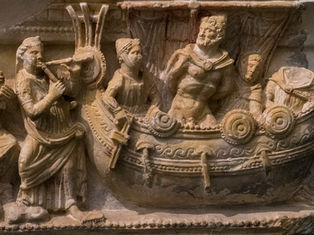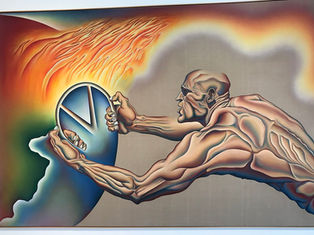top of page
Articles


Mary Wollstonecraft’s Political Philosophy: In Conversation with Sylvana Tomaselli
Sylvana Tomaselli is a historian and lecturer in political philosophy at the University of Cambridge, where she is a fellow of St John’s...

Maria Stella Sendas Mendes
10 min read


John Morley and India: Anti-Imperialist Thought in Practice
The recent upsurge of interest in the history of the British Empire has produced a wealth of literature that often presents empire and imperialism in a hegemonic light, couched in a dichotomy that sets the ‘oppressor’ against the ‘oppressed’, the ‘coloniser’ against the ‘colonised’, and so on. Underpinning fashionable postcolonial discourse, this binary terminology can obscure important nuances of political thought in its proper historical context, such as how prominent figur

Matthew Fisher
31 min read


Arts, Excellence, and Warranted Self-Respect
Funding for the arts is quite frequently commended by political philosophers and political pundits—whom I shall call ‘edificatory perfectionists’—as a policy that can incline people to improve their ways of life by taking advantage of cultural opportunities.[1] By contrast, this article advocates such funding because it can promote the occurrence of outstanding achievements and thereby help to bring about the conditions under which every citizen can be warranted in feeling a

Matthew H Kramer
44 min read


Towards a Cosmic Humanism
When writing critically about the Russian avant-garde, one finds oneself inexorably drawn towards cosmism, as inexorably as the Earth...

Boris Groys
10 min read


In the Wake of Colston: Wake Work after Woke Work
What does it mean to defend the dead? To tend to the Black dead and dying: to tend to the Black person, to Black people, always living in the push toward our death? It means work. It is work: hard emotional, physical, and intellectual work that demands vigilant attendance to the needs of the dying, to ease their way, and also to the needs of the living. —Christina Sharpe[1] A world divided into compartments, a motionless, Manicheistic world, a world of statues: the statue o

Jacob Badcock and Jovan Owusu-Nepaul
19 min read


The Space Race and Its Discontents: Hannah Arendt on Space, 1951-63
Introduction Arendt’s account of modernity and The Human Condition (1958)[1] Opening the final section of The Human Condition...

Clare Francis
20 min read


Augustine on Canonical Penance: An Ethic of Criminal Sentencing
Introduction Canonical Penance in the early Church and the modern concept of prison, broadly construed, are both processes of...

Alexander Levy
21 min read


Elite Overproduction: An Inside Perspective
1 To become an administrative official in imperial China necessitated following a burdensome path from an early age. To begin with, a...

Jakob Gomolka
10 min read


Patriarchy and Politics: In Conversation with Professor Cynthia Enloe
Well-known for her book Bananas, Beaches and Bases , exposing the embedded systemic and institutionalised patriarchy that is evident not...

Teresa Turkheimer
13 min read


‘Canst thou draw out Leviathan with an hook?’: Job 41 in Hobbes’ Masterpiece
Can you draw out Leviathan with a fishhook, or press down its tongue with a cord? Can you put a rope in its nose, or pierce its jaw with a hook? Will it make many supplications to you? Will it speak soft words to you? Will it make a covenant with you to be taken as your servant forever?[1] * The rich symbolic inner workings of Hobbes’ Leviathan have been much commented on in the centuries since its publication, with most attention being given to its incomparable frontisp

Peter McLaughlin
12 min read


A Witness Walking to these Shores: Embodied Memory and the Dispersed Spatiality of Networked Presence
A witness walking to these shores in our time would not spy a single war-worn and sea-tossed Ithacan sailor returning to his homeland but rather thousands of woeful, current- day avatars of Odysseus, refugees who in the words of Homer find themselves ‘τῆλε φίλων καὶ πατρίδος αἴης’, ‘far from friends and home’. The linkage of space, politics, and the humanities in the theme of this conference is something more than a matter of mere historical timeliness—and certainly not opp

Michael Joyce
16 min read


Thus Dunks Zarathustra
It didn’t take long for the backlash against last summer’s enthralling ESPN Michael Jordan documentary The Last Dance to arrive. Before...

Hugo Drochon
5 min read


Performative Activism and the Murder of George Floyd
This piece was written in the direct aftermath of George Floyd’s murder on 25 May 2020. Since then, having also been selected as an...

Chater Paul Jordan
12 min read


‘A heap of broken images’: The Possibility of Connection in TS Eliot’s The Waste Land
Eliot’s work is filled—especially the poetry—with masks, role-playing, and multiple voices. Yet it is saturated everywhere, too, with...
Asseel Darwish
15 min read


The Cultural Logic of Statues
A statue tumbles and, with an almighty splash, sinks below the water. Those responsible cheer with joy. Onlookers are captured in a range of emotions: confusion, rage, wonder. What is taking place? Is this an anti-historical act of violent vandalism, or the liberating removal of a relic of the colonial era, an enduring reminder of oppression? When Black Lives Matter protesters in Bristol toppled the statue of the merchant and slave trader Edward Colston in June 2020, it was

Jack Graveney
12 min read


Egalitarianism and the Neoliberal Work Ethic: In Conversation with Professor Elizabeth Anderson
John Dewey Distinguished University Professor and Arthur F. Thurnau Professor of Philosophy and Women’s Studies at the University of Michigan, Elizabeth Anderson is famously redefining egalitarianism in the field of political philosophy. Conventionally, philosophical debate has imagined the two concepts of equality and freedom to be polar opposites. Anderson has sought to challenge this perception by subordinating the popular egalitarian notion of distributive equality to tha

Teresa Turkheimer
15 min read


Does Pornography Silence Women?
In Indianapolis in 1984, an unusual political alliance was formed. On one side was the staunchly conservative city council and on the...

Adam Rachman
10 min read
bottom of page

